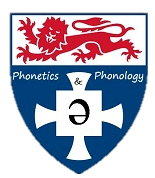-
News:
Accent Articulation Conference First Language Acquisition gamification Group focuses Job Laboratory Phonology Lecturer Linguistics Morphology Perception PhD Funding Phonetics Phonetics and Phonology Phonology Professor Project on Tyneside English Psycholinguistics R Research associate science open day Sociolinguistics Sociophonetics Speech Signal Analysis Speech signal processing statistics Workshop
Monthly Archives: September 2019
19th International Congress of Phonetic Sciences – Caitlin Halfacre
Post originally appeared on the PhilSoc Blog In August 2019, I was supported by a PhilSoc travel bursary to attend the 19th International Congress of Phonetic Sciences, to present a poster. The conference was in Melbourne, hosted by The Australasian … Continue reading

